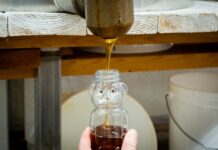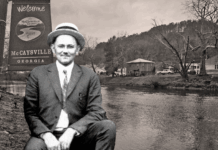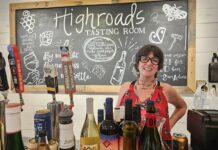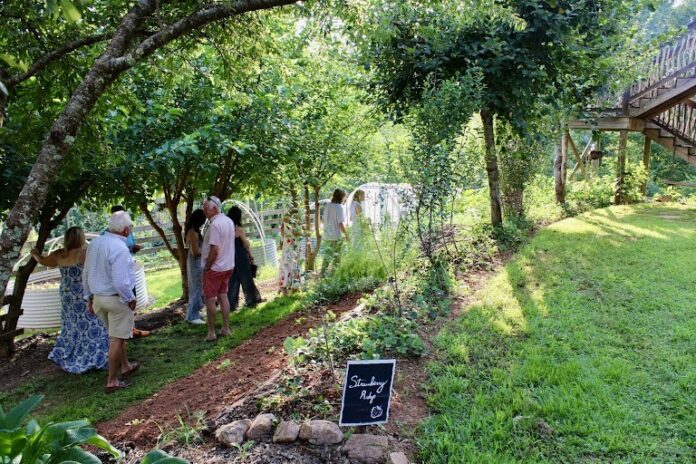
We sit on the covered front porch, bathed in the soft light of a winter morning. The sky, a crisp cerulean, stretches overhead, and the family dog perches at my knee. In the distance, Vinny Correa pushes a wheelbarrow while Allie sits beside me, keeping an eye on their toddler as she plays in the yard.
As I watch the scene unfold, something shifts within me. I settle back into my chair, adopting the unhurried ease of Southern women on a visit, and let myself steep into the
conversation like a tea bag gently unfurling in warm water.
The Natural Trajectory
Naturally, our discussion begins with growth—first in the crops, then smoothly transitioning into a chat about the development coming to Habersham County. It’s the natural trajectory for a region where abundant trees, fresh air, and a strong community draw increasing numbers of people seeking refuge from the relentless pace of city life. Yet, while growth is inevitable, the question facing Clarkesville and its surroundings isn’t whether we will grow, but how and when we will do so.
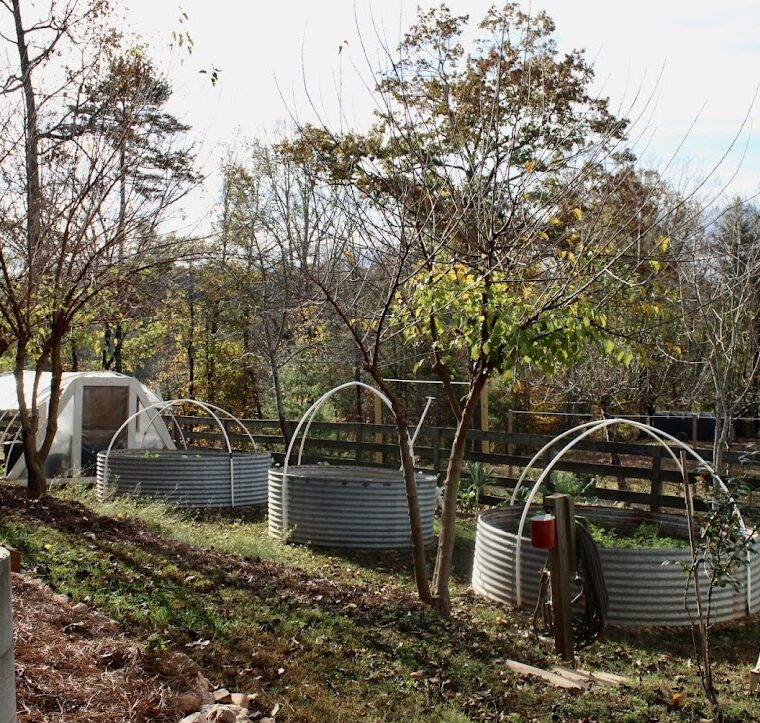
As this small town looks toward its future, Arrows Farm provides a clear example of how we can manage that expansion with foresight.
In a region that has long held to its rural roots, Clarkesville faces an influx of new residents and a growing sense of transition. With this shift comes inevitable tensions. Not everyone will embrace the changes. Some will resist, grieving for a slower, simpler time.
Complaints will appear on social media, and nostalgia for a bygone era will hang like the fading earthy scent of cedar in a grandmother’s trunk. Yet, as Arrows Farm demonstrates, there is a way to welcome progress without sacrificing the soul of a community.
A Legacy of Land Stewardship
Vinny and Allie Correa, the couple behind Arrows Farm, are no strangers to growth and
adaptation. They moved to downtown historic Clarkesville in 2019, bringing with them a
burgeoning desire for simple living. Vinny, a Marine veteran, spent much of his career in private security in places like Baghdad before returning to his agricultural roots.
His family legacy includes a farm in Brazil where his grandfather raised cows, chickens, and rows of coconut trees, instilling in Vinny a reverence for the land and its cycles. The care and precision with which his grandfather planted trees and cultivated crops shaped Vinny’s own approach to farming, where each decision is made with consideration of both the present and the future.
Allie, with her background in education, brought a different yet equally essential skill to the farm: the ability to communicate the intricacies of farming and crop management to others. Through her teaching experience, she honed the art of explaining complex ideas in ways that were accessible and engaging, a crucial trait when passing on farming knowledge to a new generation.
In many ways, the Correas’ approach to farming mirrors their approach to
community growth—patient, deliberate, and thoughtful. The Correas’ commitment to sustainable progress provides a powerful example for Clarkesville. In our rush to grow, we must not lose sight of the importance of planning. Allie and I discussed the significance of prudence, emphasizing the need to resist the temptation to expand too quickly and recognizing the importance of approaching expansion, whether on a farm or in a
city, with care.
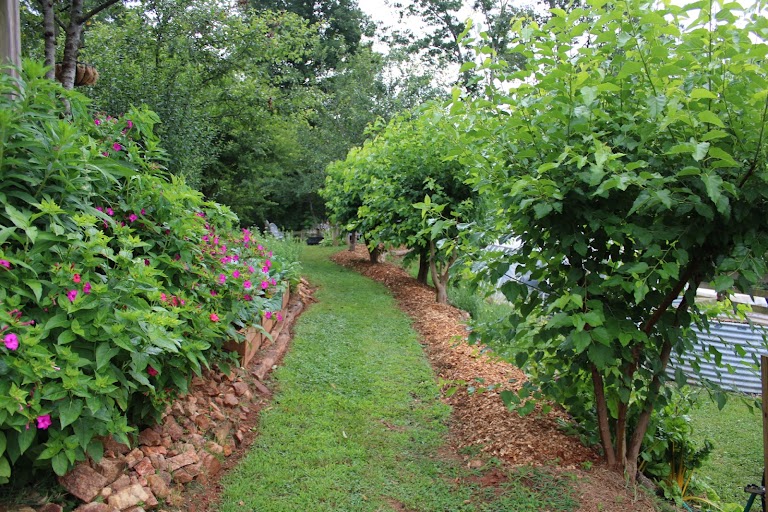
Like plants, cities require the right infrastructure to thrive. For a farm, it’s the soil, space, and careful attention to environmental conditions. When not managed properly, the wrong sort of bloom takes root and weeds overtake the garden. Similarly, for a town like Clarkesville, it’s the roads, schools, businesses, and healthcare systems that transform growth from merely endurable to genuinely pleasant.
Thoughtful expansion
As the Correas’ thoughtfully expand within their means and in harmony with the land’s natural demands, our community can similarly shape development in a way that honors its roots. Sustainability doesn’t mean stasis—it calls for nurturing a strong foundation while ensuring that infrastructure supports and encourages the flourishing of both residents and the environment.
Thus, Vinny and Allie’s farm serves as a microcosm for what Clarkesville’s future could look like. It’s not about rejecting change but understanding how to mold it. With foresight, adaptability, and planning, the town can grow into its future, not by resisting but by embracing its potential. Drawing inspiration from Arrows Farm, we can approach this growth with optimism and stewardship.
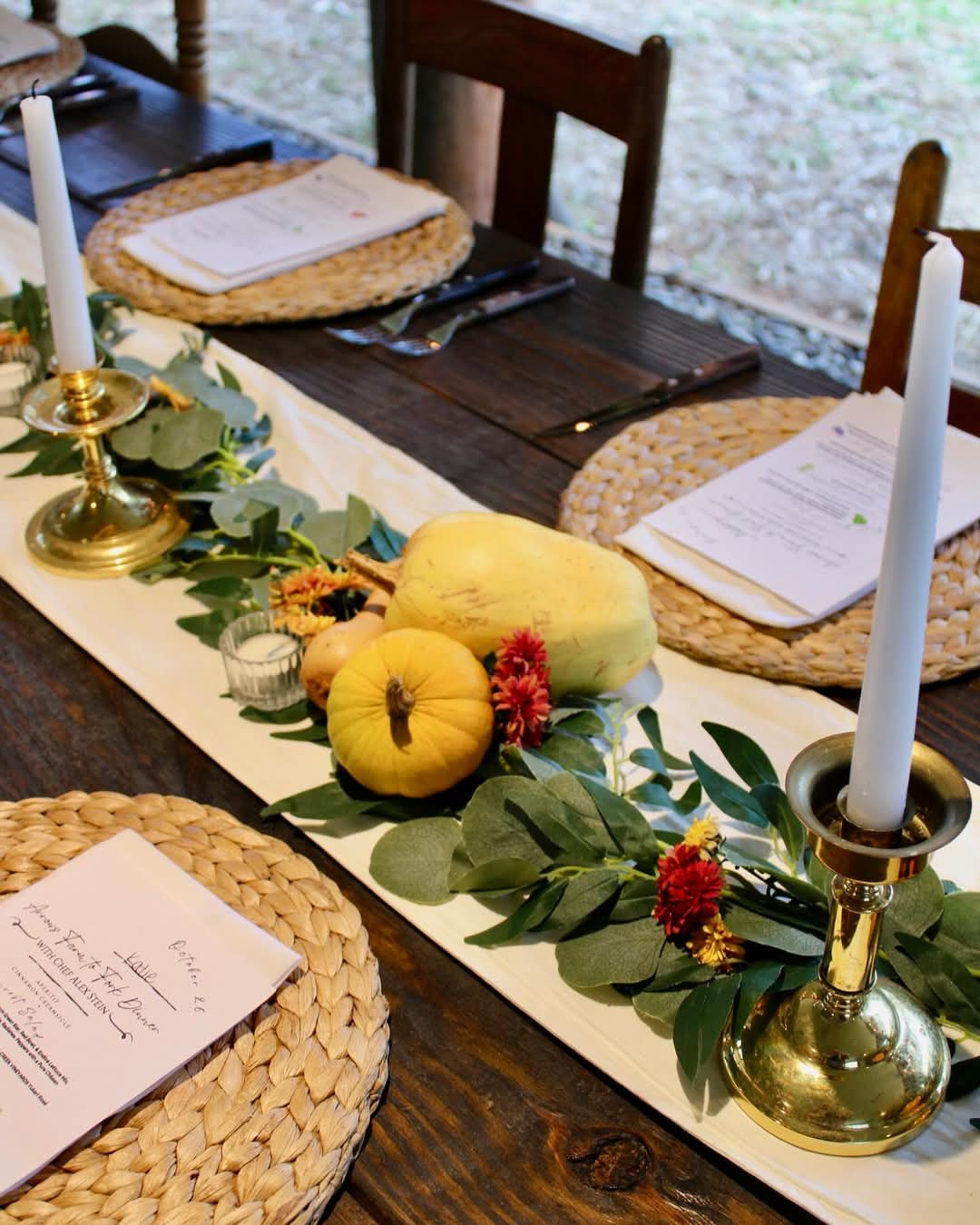
So, what does it mean to anticipate progress? I can more easily tell you what it won’t mean. It won’t mean congested streets crowded with pawn shops, liquor stores, chain retail outlets, and vape shops. Instead, anticipating growth means thoughtful city ordinances and strategic zoning that guide development to reflect the evolving preferences of residents—people who want the amenities of city life without living in Atlanta.
Thoughtfully enacted progress better serves residents and draws higher-income individuals with discretionary spending, fueling local businesses and strengthening the tax base. Why does this matter?
Consider the perennial empty boutiques, salons, and cafés dotting our historic streets—spaces filled with potential but left stagnant and underutilized.
And let’s be clear: progress doesn’t mean stripping away what makes North Georgia special.
The appeal of life here lies in its old-growth oaks and rolling landscapes, not in transforming it into a concrete jungle of spindly trees, Bermuda grass, and yet another mixed-use facility. Anticipating progress means fostering growth that respects the region’s natural beauty while supporting the existing population, contributing newcomers, and the businesses we all wish to see thrive.
The Correas’ Continued Agricultural Journey
By the time summer arrived in 2022, Arrows Farm was in full bloom, offering an abundance of fresh produce that would soon become the foundation for a new community initiative: the Little Arrows Farm Camp. The children’s camp emerged as a response to the growing desire for a connection to the land and a simpler, slower way of life. In a world where children spend more time with screens than with soil, the Correas saw an opportunity to offer something different.
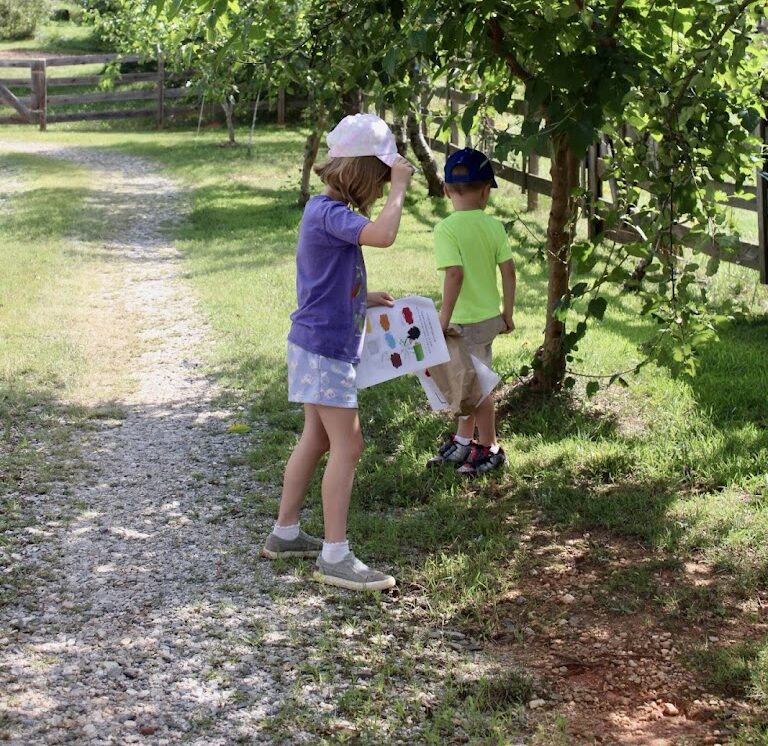
Each week, children aged 3 to 6 and 7 to 11 gathered Monday through Thursday to learn the fundamentals of gardening, participate in farm chores, play games, engage in arts and crafts, and keep a garden journal. They also had the opportunity to take home a plant of their own.
Away from screens and immersed in nature, children experienced the pleasures of snacking on fresh blueberries and plums from the bush, cucumbers, and garden smoothies. The camp, which will return in 2025, prices at $150 for the first child and $125 for siblings, offering an affordable, hands-on way for families to reconnect with the earth. Returning campers receive a 20% discount, and early sign-ups receive a 10% discount, making this wholesome experience accessible to many.
Despite the cold of the January wind, I feel strangely warm as I reflect on the nature of the farm camp. The Correa’s camp reminds me of the simpler childhoods of the girls I read about in books like Anne of Green Gables or Rebecca of Sunnybrook Farm, where the world slowed down long enough for children to roll up their sleeves, get their hands dirty, and play!
I enjoy picturing pants legs damp with morning dew, hands pleasantly dusty, and shirts stained with paint and blueberry juice—these are the memories the Correas are crafting for the next generation.
Farm-to-Fork Dinners: Cultivating Community
In addition to educating future gardeners, Arrows Farm has created a new local tradition with its Farm to Fork Dinners. These dinner events, which are becoming increasingly popular, combine the best of local food, farm education, and community-building. Each dinner begins with the gathering of guests around a bonfire, a communal ritual as old as human existence. Here, locals chat amicably, sharing stories and forming connections. This is not just a dinner; it’s a celebration, a gathering that draws on the rhythms of nature and the bond that comes from sharing good food and company.
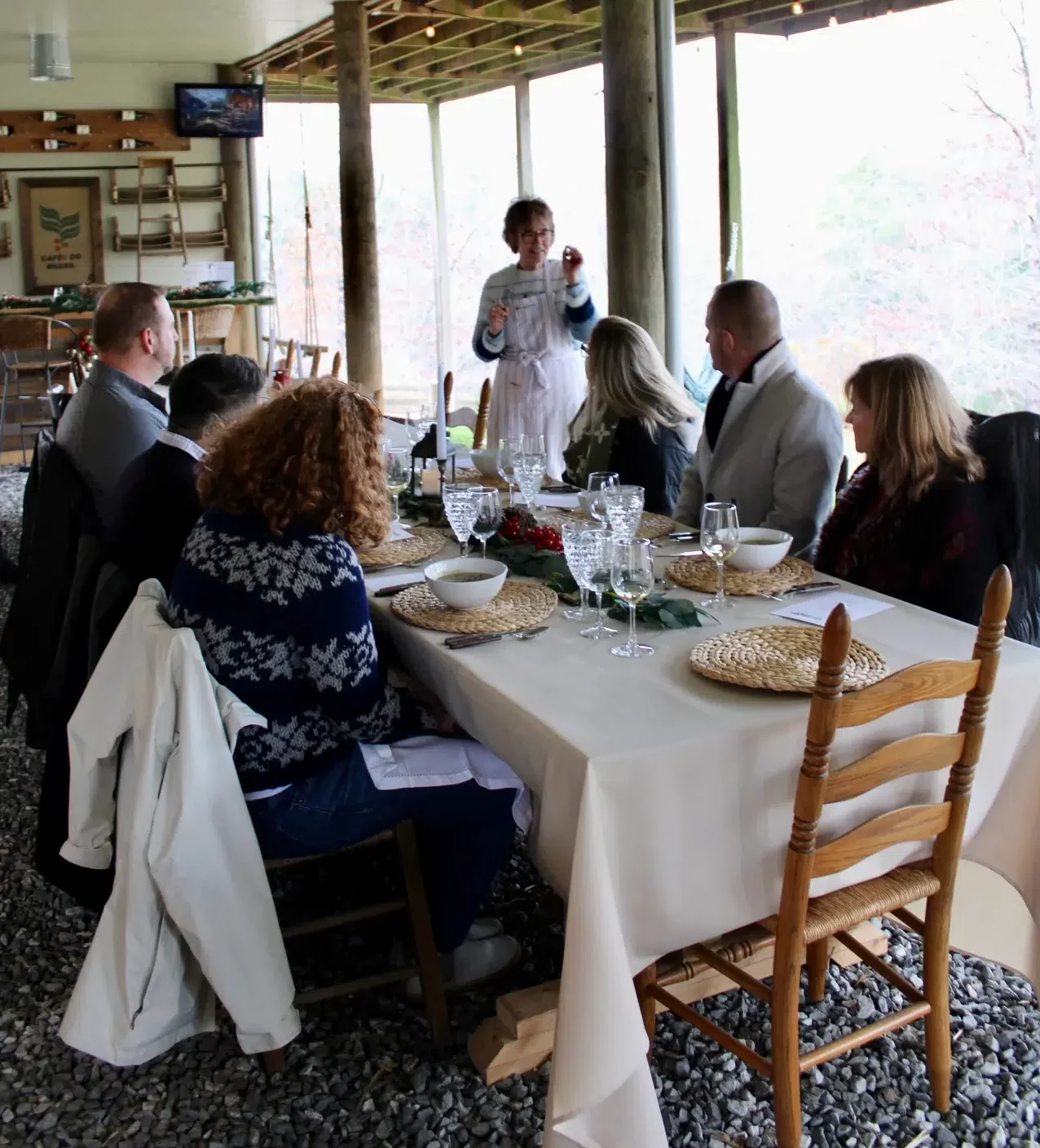
Vinny, ever the gracious host, leads guests on a tour of the property, offering insights into
organic farming, tips for growing one’s crops, and the unique ways Arrows Farm tends to its land.
The air is filled with the tantalizing scent of Chef Alex Stein’s gourmet cooking, mingling with the natural fragrance of the farm.
After the tour, guests enjoy a meal crafted from local ingredients and Arrows produce. Each dish tells the story of the land, seasons past, and the hands that till it.
A Lesson in Sustainable Growth
As we discussed the future of Arrows Farm, I was reminded of a line from Downton Abbey:
“Farming requires sentiment but not sentimentality.” That philosophy seems to guide the
Correas’ approach to both their land and their lives. On their farm, nothing is wasted or forced; everything has a role to play. The potted comfrey plant, for example, soothes sore muscles after a long day’s work while nourishing nearby fruit trees. Fallen leaves protect plant beds and enrich the soil with organic matter. Each element of the farm serves a purpose, either for itself or for something else. But anything that fails to contribute ends up on the burn or compost pile, making way for growth and renewal. When the cycles of nature are respected, the farm thrives.
Conclusion
As Arrows Farm demonstrates, expansion doesn’t have to be an unmanageable force that
disrupts the character of a community. With foresight, patience, and respect, growth can be a force for good. For Clarkesville, the lesson is clear. Gainesville is expanding and consequently so is our community, but we have the power to shape it in a way that honors our heritage, nurtures our values, and builds a sustainable future for generations to come. Just as Arrows Farm cultivates its land with care, so too must we cultivate the future of Clarkesville, one season at a time.

